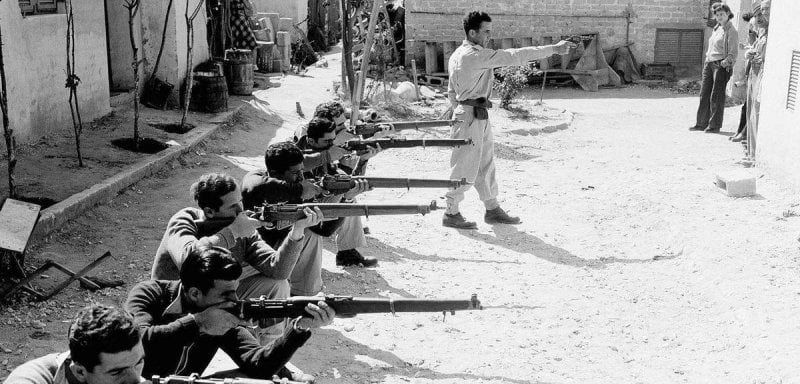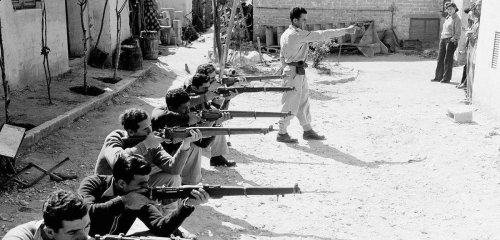Israel insists on imposing strict censorship on thousands of historical documents that support the Palestinian narrative of what happened during the Nakba, Arabic for catastrophe, when Palestinians were chased out on Palestine in 1948. The documents reveal details of how Arab residents were expelled as Zionist military organizations committed war crimes against them, from murder to torture to looting.
Israel has a myriad of pretexts to impose this censorship, with the excuse sometimes being “to preserve the image of Israel”, “out of fear for Israel’s international relations”, “the time is not right”, or “fear of reprisals” if details of the “horrific events” that the documents hide are ever revealed.
Israel’s Archives Law permits the restricting of access to documents kept in the Israeli archives anywhere between 15 and 90 years, depending on the content and source of the document. The documents of the Israel Security Agency (aka Shabak or Shin Bet) and Mossad are the longest preserved, and censorship is kept over them for 90 years. As for documents believed to pose a “threat” to the national security or foreign relations of Israel, censorship over them can be extended several times.
The Israeli authorities have finally agreed to release a few thousand documents concerning the Nakba period but not those that are “highly sensitive” or “unpleasant” for Israelis.
This came in response to a request made by the Akevot Institute for Palestinian-Israeli Conflict Research, whose work is based on the belief that reaching the truth, establishing the true version of events, as well as refuting and excluding false historical narratives will contribute to achieving objective solutions to end the long-standing conflict.
To “preserve the state’s distorted narrative of the causes of the conflict”… Israel insists on withholding documents that verify the Palestinian narrative of the Nakba under several pretexts, including concerns over “Israel’s image and foreign relations”.
Documents Forbidden from the Public Eye
The list of historical documents that Israeli authorities insist on imposing strict censorship on and the Institute demands be published, include the files of the Ministry of Minority Affairs between 1948 and 1949, which deal with “the expulsion of Arabs”. Only 40 out of 80 documents were declassified. The Israeli Prime Minister’s Office conceded in advance that the reason that they wanted to keep the files sealed is that they “mention the expulsion of Arabs, the confiscation of Arab property and acts of cruelty committed against the population by soldiers.”
There is also the “Riftin Report of 1948” which presents the findings of an investigation conducted at the request of former Prime Minister David Ben-Gurion to verify a series of disturbing incidents that raised suspicions that “Haganah soldiers committed murder, torture, pillaging, theft and looting” during the Nakba.
“The Refugee Study of 1964” is one of the documents that Israel continues to insist on not publishing, and has to do with “the reasons for the refugee flight in 1948”. They are doing so out of fear that exposing its contents would harm Israel’s international standing and “affect Israel’s ability to deal with future negotiations with the Palestinians or decisions by the UN Security Council on core issues concerning Palestinian refugees,” according to the Israelis.
Around 130 members of the secret Zionist paramilitary organizations “Etzel (Irgun)” and “Lehi” raided the village of Deir Yassin, on the morning of April 9, 1948, and with the help of the Haganah, killed around 300 men, women, children and elderly civilians.
“The case file on the 1948 Deir Yassin massacre” which includes documents and horrific photos of the victims, has been repeatedly denied release. In 2000, the Israeli Attorney General ruled that “there is no need to grant access (declassify) to materials related to this painful and emotionally charged affair.”
Again in 2007, the Israeli Ministerial Committee authorized to publish archive material, decided that “the issues related to Israel’s foreign relations and tied to the events of 1948 have not been resolved, nor has the conflict come to an end”. The rejection was repeated in 2010 and 2017.
The request made by Akevot to publish 39 pages of was denied, as they refer to “the expulsion of Arabs, the destruction of villages, perpetrating looting, pillaging, rape, and murder by the Israeli army and Haganah.”
The request made by Akevot to publish 39 pages of records of government meetings (minutes of meetings held by the interim government between 1948 and 1949) was denied, since they refer to “the expulsion of Arab citizens, the destruction of Arab villages, as well as perpetrating acts of looting, pillaging, rape, and murder by the Haganah and the soldiers of the Israeli army.”
There are also 10 secret documents from the Israeli army archives dating back to 1948 that are under strict censorship. Even though their contents remain unknown to this day, one of the files was described to contain “material that may damage the reputation of the IDF as an occupying force without ethical or moral principles”.
Because of the “possibility that it may harm the national security and foreign relations of the state”, Ya’akov Shimshon Shapira’s 1948 report on “whether the loss of lives of Arab residents of the Galilee and the south has been caused by Israeli soldiers or the military, in contravention of the accepted laws of war,” was kept under wraps.
“Political Considerations”
The Akevot Institute believes that the continued enforcement of a total ban to publicize these documents after all these years is due to “political and illusory considerations that are not based on any legitimate realistic grounds”. The institute’s executive director Lior Yavne, along with researcher and historian Adam Raz also believe that the documents are still subject to censorship “on grounds of concerns over national security and the country’s foreign relations.”
“Ongoing secrecy is not intended to protect state interests externally”.. An Israeli institute accuses Israel of deceiving its citizens by concealing historical documents of events during Nakba, contributing to “a distorted history of Israel’s early statehood”.
But the institute asserts that these decisions to ban “produces a distorted history of Israel’s early statehood, and harms the public and political debate in the state.”
Indicating that Israel does not fear for its external image, but rather aims to continue to conceal and deceive its citizens with its misleading narrative of the Nakba, Akevot stated that “the ongoing secrecy is not intended to protect state interests externally, but rather internally.”
“This concealment does more than obstruct historians. It has a tangible impact on the current academic, public, and political discourse within Israel,” the Israeli Institute concluded, stressing that the purpose of Israeli censorship “is designed to preserve the sterile, distorted official state narrative on the foundations of the Israeli-Palestinian conflict.”
Raseef22 is a not for profit entity. Our focus is on quality journalism. Every contribution to the NasRaseef membership goes directly towards journalism production. We stand independent, not accepting corporate sponsorships, sponsored content or political funding.
Support our mission to keep Raseef22 available to all readers by clicking here!
Interested in writing with us? Check our pitch process here!




